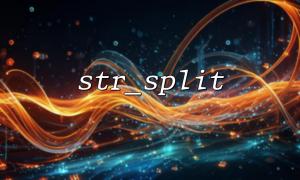In PHP, the str_split() function is used to split a string by a specified length and return an array of strings. By default, str_split() splits the entire string into single characters. If the string is empty, that is, a string of length 0, what will str_split() return?
The basic syntax of the str_split() function is as follows:
str_split(string $string, int $length = 1): array
$string : The string to be split.
$length : Specifies the length of the split. The default is 1.
The return value is an array containing the split string parts. If the length of the segmentation is unreasonable or the string is empty, the behavior of the function also has some special manifestations.
When we call the str_split() function to split an empty string, the result returned will be an empty array. This is because an empty string has no characters to split. Therefore, the returned array also has no elements.
<?php
$str = "";
$result = str_split($str);
print_r($result);
?>
Output result:
Array
(
)
As shown above, when the passed string is empty, str_split() returns an empty array.
Even if we modify the $length parameter to try to split an empty string, str_split() will still return an empty array. Because no matter the length of the segmentation is, the empty string itself has nothing to be divided.
<?php
$str = "";
$result = str_split($str, 5); // Try by length 5 Split empty string
print_r($result);
?>
Output result:
Array
(
)
When using the str_split() function to split an empty string, the function always returns an empty array. This is because there are no characters to split, so no array elements return.















